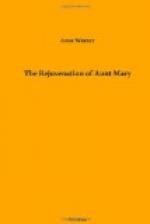“I see him,” said Aunt Mary. “My! I’d know him as far off as I’d know anybody.” But then she sighed. “I wish the others were there, too,” she said sadly; “seems awful—just three of us.”
The dinner which followed echoed her sentiment. It was a very nice dinner, but painfully quiet, and Aunt Mary grew very restless.
“Seems like wastin’ time, anyhow,” she said uneasily. “I don’t see why the others didn’t come. Well, can’t we go to Coney Island or the Statue of Liberty or somewhere when we’re through?”
Mitchell looked at Jack.
“Why, you see, Aunt Mary,” the latter promptly shrieked, “we thought we’d be good and go home early and sort of rest up to-night so as to have a high old time to-morrow.”
Aunt Mary’s face, which had fallen during the first part of their speech, brightened up at the last words.
“What are we goin’ to do?” she inquired with unfeigned interest.
“Burnett’s going to give us a dinner,” Jack answered, “and then afterwards we’re going to help you see the town.”
“Oh!” said Aunt Mary. A pleasant gleam fled over her face.
“I never was a great believer in bein’ out nights,” she said, “but I guess I’ll make an exception to-morrow. I might as well be doin’ that as anythin’, I presume. Maybe better—very likely better.”
“Oh, very much better,” said Mitchell. “It is the exceptions that furnish all the oil in life’s machinery. The exceptions not only generally prove too much for the rule, but they also generally prevent the rule from proving too much for us. They—”
“But I don’t see why we couldn’t go to two or three vaudevilles to-night, too,” said the old lady, suddenly. “I feel so sort of ready-for-anythin’.”
“You always feel that way, Miss Watkins,” screamed Mitchell. “It is we that are the blind and the halt. You are ever fresh, but we falter and faint. You see it’s you that go out, but it’s we that you get back. You—”
“We could go to one vaudeville, anyway,” said Aunt Mary abstractedly; “an’ if we saw any places that looked lively we could stop a few minutes there on our way back. I’ve never been into lots of things here.”
Jack looked at Mitchell this time.
“I’m sorry, Miss Watkins,” he roared, “but I’ll have to go home, anyhow. You see, I’m not used to the lively life which has been enlivening us all this week and, being weakly in my knees, needs must look out.”
Aunt Mary looked very disappointed.
“Then Jack and I’ll go, too,” she said, “but oh! dear, I do hate to waste my stay in the city sleepin’ so much. I can sleep all I want after I get home, but—” she paused, and then said with deep feeling, “Well, you don’t understand about Lucinda an’ so you don’t understand about anythin’.”
Both the young men felt truly regretful as they put her into the carriage for the return trip. Her deep enjoyment was so genuine and naive that they sympathized with her feelings when cut off from it.




